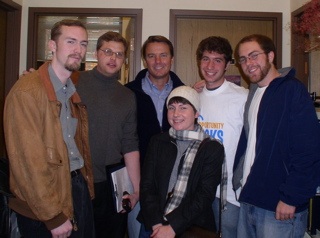Pfizer, the world’s biggest drug company, today announced that they would be laying off 10% of their global workforce in hopes of cutting overhead by as much as $2 billion. Locally, that means the company’s Ann Arbor research and development facility will close, putting 2,100 people out of work by the end of 2008. According to the “Detroit Free Press,” it also means that the company’s “177-acre, 2-million-square-foot laboratory, office and production space (will go) on the market.”
I don’t think this was the outcome that was expected in 2001, when the people of Ann Arbor, by way of their representatives, agreed to a 12-year incentive package, totaling $47.7 million, to keep the giant pharmaceutical company here. That wasn’t all Pfizer got, either. In order to seal the deal, the University of Michigan also had to sell Pfizer a 55-acre parcel adjacent to their existing Ann Arbor facility. The Board of Regents agreed in September 2001 to sell the property for $27 million. Shortly after this, Republican Governor, John Engler, and his Michigan Economic Development Corporation came to the table with their incentives. According to “Site Selection” magazine, “the state awarded Pfizer a 20-year credit on the Single Business Tax worth an estimated $25.8 million, plus a 12-year abatement of the six-mill State Education Tax, valued at $10.7 million.” Altogether, Pfizer received approximately $84 million in incentives, and the deal was struck.
So, were the abatements the wrong thing to do? I can certainly see how some, looking at the soon-to-be-vacant Pfizer complex, might think so.
As for the reasoning behind the closure, we’re being told not to take it personally. According to our Governor, it wasn’t anything that we did wrong here in Michigan. (She’s defending herself from the inevitable attacks from the right, suggesting that this was because of her having established such a “business unfriendly” environment..) Pfizer uses lots of good MBA buzzwords in their explanation. According to their press release, this restructuring will allow them to focus on “value-added activities,” “enhance total shareholder return,” “take advantage of the diverse and attractive opportunities,” “cut down on bureaucracy and reduce management layers,” “dramatically simplifying the organizational structure of R&D to increase accountability, flexibility, innovation and entrepreneurship,” and lots of other wonderful-sounding bullshit. They will also, “generate cost savings through site rationalization in research and manufacturing, streamlined organizational structures, staff function reductions, increased outsourcing and procurement savings.” I take it that what’s happening to Ann Arbor is “site rationalization.” I bet some public relations flak made a lot of dough for coming up with that euphemism…
Here’s another great quote the Pfizer PR people put out for CEO, Jeffrey B. Kindler:
“By reducing middle management and increasing spans of control, we’re getting leaders closer to colleagues and customers and giving colleagues a clearer line of sight to those aspects of the business for which they are accountable. As a result, our managers will delegate, empower and focus on developing colleagues more than ever, and our colleagues will grow and take on more responsibility than ever.”
People in public relations have no souls.
All spin aside, Pfizer has been suffering.
Some of its biggest drugs are coming off of patent. Lipitor, Pfizer’s blockbuster cholesterol-lowering drug, could come off patent as soon as 2010. And, according to the Associated Press, other patent expirations (i.e. Zoloft and Zithromax) will cost Pfizer nearly $14 billion in revenues annually between 2005 and 2007. To make matters worse, Pfizer’s perceived savior, a drug called Torcetrapid, was just pulled from the development pipeline after it was shown to have led to patient deaths and other complication… The company did do well this quarter due to the sale of their consumer-products division to J & J for $16.6 billion, but the overall trend isn’t looking good.
So, they did what they had to do to… A friend of mine that works at Pfizer actually told me that they’re handling it well. They’re trying to place some people, and the rest are getting fairly generous severance packages. And, as the jobs are being phased out over the next year and a half, it’s not as though people are just being put out on the street without warning. The question in my mind isn’t so much whether Pfizer did the right thing in this instance, but whether we’re prepared to learn from this experience. I’m wondering, in the wake of Pfizer, if maybe we learned something about tax abatements… Here, to put it in perspective a bit, is a quote from Michael Shuman’s “The Small-Mart Revolution“:
…There are literally hundreds of these stories from every part of the United States and they all are practically identical. Convinced that TINA (“There Is No Alternative” to globalization) firms will make or break a region, economic developers insist on lavishing them with taxpayer money to persuade them to come or to stay. Alan Peters, an urban planning professor at the University of Iowa who has studied these deals, says, “It seems like almost every state is giving away grandmother, grandfather, the family jewels, you name it, everything.”
And for what? The company rarely fulfills its pledges entirely, and sometimes not at all, and sooner or later it moves elsewhere. Some state and local officials have learned by now that these deals are likely to be losers, but economic developers ominously warn — there is not alternative. Peters and his colleague, Peter Fisher, estimate that public payments to TINA, nearly all made in back rooms with no public scrutiny, now cost the American taxpayer an estimated $50 billion per hear. And that’s just state and local money.
Many economic developers respond that they’ve learned from the mistakes of the past and no longer place so much emphasis on these deals. Nonsense. Eye-popping bribes in the range of $10,000 to $30,000 per promised job that were paid to attract auto manufacturers in the early 1980’s now seem modest. Alabama, South Carolina, Michigan, and Mississippi spent from $59,000 to $193,000 per job attract or retain various auto plants in the 1990’s. In the mid-1990’s Kentucky lavished two Canadian steel producers with $350,000 per job. Governor Pataki in New York recently gave IBM $500,000 per job as an inducement not to move out of the state. Governor Jeb Bush of Florida dispensed $1,000,000 per job to attract the Scripps Biological Research Center… The anecdotal evidence suggests that the bidding wars for TINA businesses are actually escalating.
Governor Joseph E. Kernan of Indiana regrets what happened with United Airline. He laments that one locality snatching jobs from another does nothing to improve the national economy and concedes that these subsidies probably don’t have very much influence on TINA business decisions anyway. “But,” he adds, “Indiand, like virtually every other state, is not going to unilaterally disarm. After all, there is no alternative…
For the record, I’m not saying that the $84 million in incentives given to Pfizer in 2001 to keep them in Ann Arbor wasn’t the right thing to do at the time. (I likewise am not saying that the incentives just given to Google to locate their Ad Words division in Ann Arbor is a bad thing.) I’m just suggesting that perhaps it’s coming time for everyone working in economic development to take a deep breath and do the unthinkable — stop giving handouts to the corporations among us, and start investing instead in local small-scale entrepreneurs, the kinds of people who are tied to your region, and likely to create jobs that last longer than five years. These deals wouldn’t grab headlines, but maybe in the long run it’s a better strategy. (Just think what kinds of entrepreneurial education we could have provided to the citizens of Washtenaw County for all the millions we lost on Pfizer.)

 In case anyone is interested, presidential candidate
In case anyone is interested, presidential candidate  I can’t imagine a better way to celebrate
I can’t imagine a better way to celebrate 









